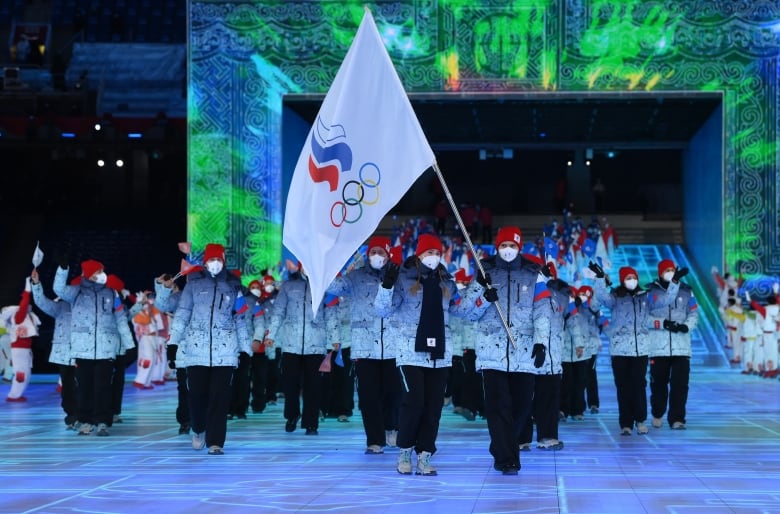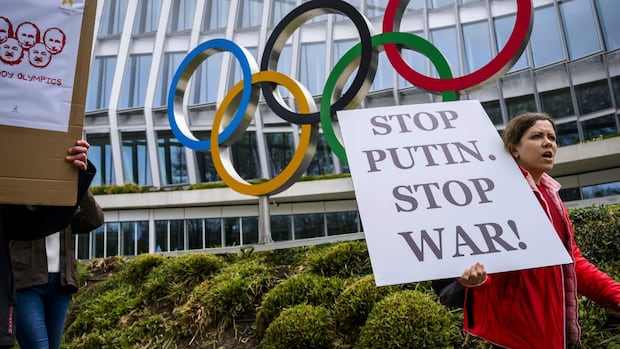
When athletes from Russia and Belarus compete at the Summer Olympics in Paris, there will be no national flags, no anthems and a much smaller delegation than in previous years as Russia’s war on Ukraine has turned a country that was once an Olympic powerhouse into a pariah.
During the Tokyo games in 2021, Russian athletes were also forbidden from competing under their country’s flag because of a state sponsored doping scheme, but the country still sent 335 athletes and took home more than 70 medals.
In Paris, only 15 Russians will be competing at the games and they will officially be neutral athletes.
The International Olympic Committee (IOC) invited 36 to participate after they qualified for their sport and passed a screening process designed to root out anyone who has publicly supported the war or military.
But more than half of those invited have refused to compete, with many opting out in an apparent protest.
The International Olympic Committee says it will allow Russian and Belrusian athletes to compete as neutrals, a plan that’s making those on both sides of the issue unhappy.
“We don’t understand why the IOC declined the participation of some athletes,” said Nikolai Makarov, the head of Russia’s trampoline federation who spoke to CBC News from St. Petersburg.
“In my opinion, it just kills competition.”
While the Olympic charter strives to create a sporting culture free of discrimination and politics, the IOC has grappled with how to handle Russia’s participation as the invasion it launched against its next-door neighbour grinds on.
Athletes are required to uphold the values of the Olympics, but they are also free to express themselves, including at post-competition press conferences.
It is only Russian and Belarusian athletes who have to undergo additional screening.
Ukraine and many of its allies have called for a sweeping ban, saying it’s unfair to give Russian athletes a platform at all on the world stage, and cruel to make Ukrainians compete against those from a country waging war against them.
Ukraine’s Olympic hopes
Ukraine has said that hundreds of its athletes and coaches have been killed since Russia launched its full-scale invasion on Feb. 24, 2022, which was began four days after the last Olympic games in Beijing wrapped up.
Since then, the daily threat of missile and drone attacks has made it difficult for the team to train.
When Oksana Livach, a Ukrainian freestyle wrestler, took on her opponent Milana Dadasheva, a Russian competing as a neutral, at the European Championships in Romania this year, she says she felt the pressure.
“It was emotional for me,” she said in an interview with CBC News from the team’s training centre near Kyiv. “I understood that I needed to fight this opponent. It was a big responsibility”
When the match was over and Livach lost, she was consumed by tears.
She says she is glad that no athletes from Russia or Belarus are competing in her category in Paris, but feels for her teammates competing in sports like tennis, swimming and canoeing.
Ukraine is sending a delegation of 140 athletes to Paris, which is a much smaller team than it usually fields at the summer games.
Few Russian competitors
Several Russian sporting federations consider the IOC’s rules around neutrality discriminatory.
Russia’s artistic gymnasts, who are always top contenders for medals, did not participate in the World Cup events that would have allowed them to try and qualify for the Olympics.
In an interview with a Russian sports channel, the coach of the program said the gymnasts refuse to compete as neutrals because it would be “betrayal” to their country, and the military personnel who are “giving their lives”

Ten Russian wrestlers who secured a spot in Paris all declined their invitations, along with the four competitors in judo.
One Russian trampolinist is headed to the Games, 18-year-old Anzhela Bladtceva, but Makarov told CBC News that initially two Russian women qualified for the event.
Yana Lebedeva, who previously competed as a neutral athlete at international competitions, had her application rejected by the IOC’s screening panel.
Makarov said the committee didn’t give a specific reason, but says they check social media accounts and look for any posts in the past that appear to support the war or Russia’s military.
Ukrainian’s Ministry of Sport highlighted that Lebedeva competed at an event in Russia in May 2023, where a large banner with the letter “Z” hung in the background. Russia uses the Z to symbolize support for its actions in Ukraine.
Social media investigations
The international non-profit group, Global Rights Compliance, looked into all of the Russian and Belarusian athletes who qualified for Paris and say they believe that another 17 of them should be banned for violating the IOC’s rules around the participation of neutral athletes.
Jeremy Pizzi, legal Advisor at Global Rights Compliance, told CBC News in an interview from Kyiv that they came to that conclusion after scouring the internet and looking into each athlete’s activity since Feb. 24, 2022
The group passed the information on to the IOC and said it received no meaningful response.
“I think it’s pretty clear that most links to the war, like open expression of support, the IOC should be looking into,” said Pizzi. “They clearly missed quite a few given our investigation.”
The group found that Russia’s lone competitor in trampoline, Bladtceva, competed at the same competition with the Z military banner and concluded that she should be banned from the Olympics.
Makarov called that assessment a “stupid finding” saying Bladtceva had nothing to do with the sign being hung up at the competition venue.
“If you go outside, we have a lot of these military signs, and what does that mean we are guilty? ” he said.
“Sports and politics are different things.”
CBC News reached out to several other sporting federations along with Russian athletes, but received no response in most cases.
Podiums and politics
While Rule 50 of the Olympic charter states that “no kind of demonstration, political, religious or racial propaganda is permitted in any Olympic sites,” political messaging has featured at the games throughout history.
Perhaps the most memorable image was when American sprinters John Carlos and Tommie Smith stood on top of the podium and raised in their gloved fists in a Black Power salute at the 1968 games in Mexico City.
The display, which was officially against the rules, is viewed as an iconic human rights protest.
But when it comes to countries waging war, the Olympic Committee has rolled out bans and boycotts.
In 1948, at the first Olympics hosted after the Second World War, both Germany and Japan were banned from taking part.
In 1980, dozens of countries including Canada boycotted the Moscow Olympics because of the U.S.S.R.’s invasion of Afghanistan.
The Palestinian Olympic Committee has called for Israel to be banned from competing at the Olympics because of the war in Gaza, but the IOC previously said that there was no question about Israel’s participation.
Even before Russia launched its full-scale invasion of Ukraine, many competitors were upset that Russian athletes had been granted the ability to compete in Tokyo and Beijing because of the country’s track record of doping.
